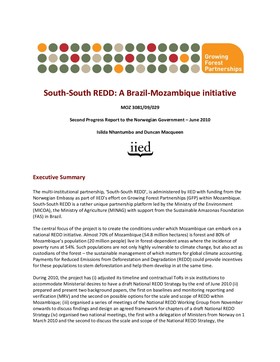South-South REDD: a Brazil-Mozambique initiative - second progress report

South-South REDD is a rather unique partnership platform led by the Ministry of the Environment (MICOA), and the Ministry of Agriculture (MINAG) in Mozambique, with support from the Sustainable Amazonas Foundation (FAS) in Brazil. ~ ~The central focus of the project is to create the conditions under which Mozambique can embark on a national REDD initiative. Almost 70% of Mozambique (54.8 million hectares) is forest and 80% of ~Mozambique’s population (20 million people) live in forest-dependent areas where the incidence of poverty runs at 54%. Such populations are not only highly vulnerable to climate change, but also act as custodians of the forest – the sustainable management of which matters for global climate accounting.
Payments for Reduced Emissions from Deforestation and Degradation (REDD) could provide incentives for these populations to stem deforestation and help them develop at the same time.
This second progress report sets out the initial findings of the project, comments on the progress to date, and sets out urgent further activities for the continued progress of the draft National REDD Strategy.
Cite this publication
Available at https://www.iied.org/g03116






